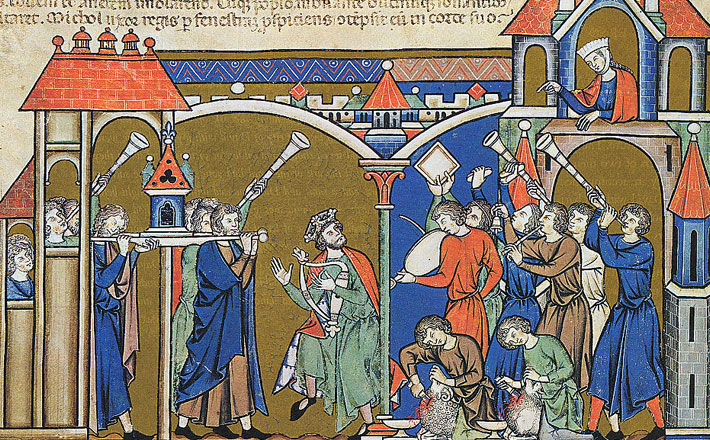Commentary on Ephesians 1:3-14
The fact of human difference may no longer surprise us.
What may surprise us in this passage is that the author stops to thank God for the foresight and grace to plan this messy human diversity.
Ephesians is a letter about living together in the midst of human differences. The author writes as a Jew to a largely Gentile audience with the message that in Christ God has “made both groups into one and has broken down the dividing wall, that is, the hostility between us” (Ephesians 2:14 NRSV). It is not easy living together as two groups who have previously been at odds with one another on religious grounds. The letter acknowledges that living with differences requires effort: it takes humility, gentleness, and patience (cf. Ephesians 4:2-3).
Before the author goes on to describe this situation and advise the recipients how to respond, he first stops to thank God for having placed us in this situation to begin with. Ephesians 1:3-14 is actually one long sentence extolling God’s action. The verbs in vv. 3-10 name God’s action, while vv. 11-14 use passive verbs to describe indirectly what God has done to or for humankind. Many of Paul’s letters open with thanksgiving for the faith or spiritual gifts of the recipient community (e.g., 1 Corinthians 1:4-9). Ephesians includes both a thanksgiving for the community (1:15-23) and for God’s action (1:3-14).
God is praised in these verses for having chosen and adopted the church as God’s own people. Verse 4 states that “God chose us” to be holy and blameless, and verse 5 adds, “he destined us for adoption as his children.” The verb in verse 11 “we have obtained an inheritance” is difficult to translate but also carries the sense of having been appointed or chosen for this inheritance. The author pours out praise to God for having chosen us.
Adoption was not uncommon in antiquity. Among the elite it served the important function of allowing for an heir if one had no children, or if one’s children died. The adopted person (who could be a child or an adult) gained social status through association with the parent’s social status. In the same way a biological child would, the adopted child benefitted from the social and political connections of their parent. They also gained wealth through their inheritance. In return the adopted child honored the parent through taking the parent’s name and being loyal to them.
Similarly, adoption by God is a blessing for which the author praises God. It is an action planned by God (vv. 5, 9, 10, 11) and also pleasing to God (“according to the good pleasure of his will,” v. 5). It results in the praise of God (vv. 6, 14) by the adopted ones, who have a share in an inheritance from God (v. 14).
The adoption indicated here is unique in that it is not the adoption of an individual but of a people. The language echoes the stories of God choosing Israel (e.g., Deuteronomy 7:6; Psalm 135:4; Isaiah 41:8), and the purpose of being chosen for “redemption” (Ephesians 1:7, 14) evokes God’s release of Israel from slavery (e.g., Exodus 6:6). In addition, all of the relevant verbs and pronouns (we, us) in the passage are plural. The author is not so much concerned with God’s relationship to individual believers as with the claim that God has chosen a people for God’s self.
There is much about God’s choice that remains unexplained. Indeed, it is part of “the mystery of [God’s] will,” which remains difficult to understand even though God has made it known (Ephesians 1:9). The fact of God’s choosing has always been difficult to understand. The author does not try to explain the inner logic or ethical reasoning of God’s choice. Instead, he notes that it is a mystery, yet one for which we should give thanks.
This people God has chosen includes both Jews and Gentiles. At the end of the passage the author describes himself as part of one group that was “the first to set our hope on Christ” (Ephesians 1:2), alongside another group including the recipients of the letter “who also heard the word of truth…and believed in him” (v. 13). God graciously adopts not a single child or even a group with one ethnic or religious identity. Instead, God chooses and adopts a diverse group of people.
Although God is the primary actor who is praised in these verses, Christ appears throughout the passage as an important part of God’s plan for adoption. God chose us for adoption “through Jesus Christ” (Ephesians 1:5). God gave grace “that he freely bestowed on us in the Beloved” (v. 6). The letter will go on to describe Christ’s central role in the reconciliation of Jews and Gentiles: “So he came and proclaimed peace to you who were far off and peace to those who were near … So then you are no longer strangers and aliens, but you are citizens with the saints and also members of the household of God” (Ephesians 2:17-19). God’s will is revealed through the death of Jesus (Ephesians 2:13, 16) as a choice of one people composed of two groups that previously were hostile to each other.
The adoption of God’s people is part of a larger plan that has been established in the past and has both present and future effects. Already God has gifted the community with every spiritual blessing in the heavenly places. This is not simply a promise of future gifts to be experienced in heaven, but a present gift of spiritual blessings. Similarly, in Ephesians 1:14 the Gentiles are described as having been sealed with the Holy Spirit, likely a reference to baptism. The experience of transformation by the Spirit is “a down payment of our inheritance” (v. 14). Believers participate now in something that is a preview of the gifts that will be realized fully in the age to come.


July 12, 2015